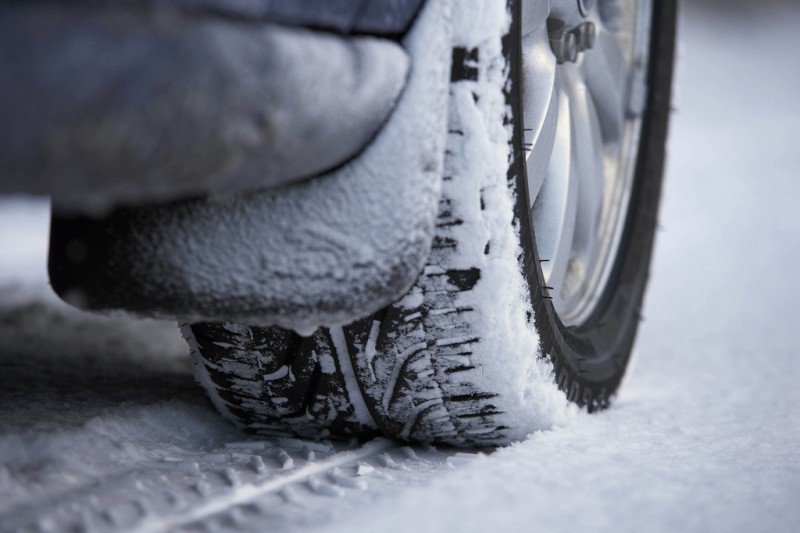Our Scrappage, Recycling and Car Blog
later post | index | earlier post
Winter Tyres – everything you need to know
Monday, 16 January 2017

Unless you’re a real petrol head – and kudos if you are – the chances are that you probably don’t spend too much time thinking about your tyres.
But did you realise that by ignoring them, you could be putting the safety of you and your family at risk? With the cold weather now starting to set in, we thought this would be a great time to take a look at winter tyres.
(Yes, they’re different from summer tyres – or at least, they should be!)
What are ‘winter tyres’?
Put simply, winter tyres make use of a tread rubber compound – with high silica content – and a tread pattern which is specifically designed to keep its flexibility in lower temperatures.
(In this case, ‘low’ temperatures is anything below 7 Celsius).
The flexibility resulting from the compound helps the tyres perform better in snow and ice, and can also help on colder wet roads.
How to recognise winter tyres
You’ll be able to spot winter tyres from the sidewall symbol, which will usually be either a snowflake or snow-topped mountains.
Are winter tyres a legal requirement in the UK?
The quick answer is: no, they are not a legal requirement in the UK.
Many parts of mainland Europe legally enforce the use of winter tyres, though that’s not the case in the UK. There are a number of reasons for this:
- Much the UK rarely experiences weather conditions necessitating winter tyres.
- A lot of UK drivers are sensible enough to avoid even using their car when the harsher weather hits.
- If winter tyres were supplied in sufficient volume, the cost of them would actually be prohibitive.
So, should you buy winter tyres?
For some drivers in the UK, winter tyres are a sensible investment. If you live in a more remote area, or an area in which conditions are tough during winter, they can make a big difference in your vehicle’s overall performance.
Motorists in Scotland, Wales and the North of England often find that winter tyres help them maintain control when ice and snow is gripping the roads. They can also help when navigating the more mountainous terrain.
One important thing to bear in mind is that winter tyres should only be used for winter: they won’t be as effective once the weather improves. So, if you go the winter tyre route, you’ll be looking at changing your tyres once every few months.
You could also consider ‘all-season’ tyres
‘All season’ tyres are also available from many of the main tyre manufacturers. Their tread pattern is usually somewhere between a winter and summer tyre and they have a high silica content designed to give flexibility when the weather is at its coldest.
As with any form of compromise, performance won’t reach the levels of the more specialist tyres, but they will usually perform better on winter roads than a standard tyre plus, you’ll be able to avoid replacing your tyres twice a year.
Do I need to tell my insurer? What about going abroad?
Typically, no. It’s not normally necessary to tell your insurer if you use winter or all-season tyres, even if your speed index might be slightly lower as a result. The speed limit will usually still exceed all national limits, with the possible exception of some German autobahns. It’s also not something typically checked as part of the passenger car MOT test.
It is standard European practise to keep two sets of wheels – winter and summer – available. As long as you do this, you shouldn’t run into any problems providing your winter tyres are fitted to the correct specification.
What’s the correct specification? Simple:
The wheel size, diameter, width and offset must all conform to the manufacturer’s specifications.
Of course, with any insurer it’s always wise to double-check just in case their policy has changed.
Don’t forget your tyre tread
It’s obviously still a legal requirement to ensure your tyres have the necessary tread. At least 3mm is recommended for the colder months, as it’ll help your tyres grip the road.
The legal requirement is no less than 2mm.
Check out our online store
If you’re on the hunt for winter tyres, check out ASM Autos’ online parts store. We sell high-quality replacements parts at excellent prices, ideal for when your motor needs an upgrade.
later post | index | earlier post
Categories
- Car Maintenance 25
- Driving Abroad 2
- Economy 1
- Environment 3
- Insurance 2
- Light-Hearted 1
- Motoring Guides 6
- Motorways 1
- New Car Sales 1
- Safety 4
- Salvage 14
- Social & Community 5
- Used Cars 19
- Winter Driving 2
Recent posts
- Car Cleaning Tips
- The Most Stolen Cars in UK
- ABI Vehicle Salvage Code of Practice
- Car CO2 Emissions
- How To Replace A Car Air Filter
- Recycling a Car: 5 Fascinating Facts
- Clocking, Cloning, Ringing and Cut & Shut
- MOT: the complete guide
- Used Tyres Guide
- What is GAP insurance?
- Guide to finding a replacement car engine
- Does the scrap value of steel affect your car’s scrap value?
- What are the most valuable salvage car parts?
- The Ultimate Guide to Replacing Wing Mirrors
- ASM Has Procured Over 350 Jaguar and Land Rover Flood-Damaged Cars!